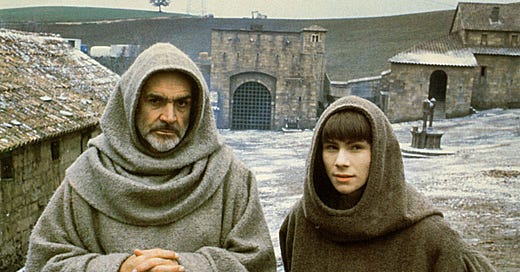There is an exciting new standard for content and engagement that has emerged so quickly that it is difficult to escape. That new standard: illiterate nonsense! It is lurking within all levels of public forum, or else bullishly out there as proud displays of an anti-linguistic ideology. Everything is slop. Everything’s computer! Everything will soon be enshittified. If literacy is a wide, webbing aptitude woven intricately between past historical contexts and present rhetorical tactics, then illiteracy is the gleeful destruction of this beautiful connective fiber, without which one is yoked to the present by their emotional reactions and…not much else. If we could just not be burdened by sensibility and justify our failed communication abilities by declaring that it doesn’t matter after all, finally we will free ourselves from critical thought and the reflections that turn back upon us our frail identities. Thinking this way for long enough will make you start to lose your mind. As I have done.
I am thinking about language and absence when I somehow digitally wander into the books section of Amazon, morbidly curious about the state of literature on one of the web’s biggest anti-literacy, most gleefully illogical platforms. So I have a hard time believing that Oxford art history scholar Professor Marko Ilić, whose first book, A Slow Burning Fire: The Rise of the New Art Practice in Yugoslavia, published by MIT press, has also written The Book of Lorem Ipsum—the best gift for every graphic designer that I located (but did not purchase) from Amazon dot com. You can read a sample of the book on Amazon, but only the merest taste, which is limited to an opening quote (in lorem ipsum) and the praise printed on the back cover, meaningfully selected from -every graphic designer ever, -my wife, and -The Devil. The product has no reviews. When you click on the author’s name, the other books he has authored include five standard college ruled notebooks, four with badly drawn fists in the air to evoke some rudimentary sense of an uprising, and one covered in sprinkled donuts.
I’m not sure if this is meant to be a social experiment conducted by Professor Marko Ilić for a class at Oxford, or if there is another Professor Marko Ilić dedicating his time in earnest to self-publishing what has long been freely available, or a nefarious (and, ergo, most believable) third option. I find a lorem ipsum generator and take it for a spin, asking the program to churn out 100 paragraphs of text, and it works. Translations of the text roughly manage to describe the nature of pain and suffering, good and evil, with various degrees of error and prevailing nonsense. It seems easy enough to generate 300 pages worth of disfigured Cicero, slap a public domain image on the thumbnail, and make a one-time nine bucks off some browsing rube. Modern hustling. So far adrift from the arts of subtlety and charm.
Such excess at a swipe and click is hard to stomach. Text for text sake, dropship flooding, plentiful and meaningless reviews, commodified writing, a constant inundation of cheap goods, trending goods, life hacks, must haves. Being stalked by an algorithm that follows with an open mouth, waiting for our vigilance to fail. So now what? How are we supposed to align art and culture if art is media and media is choked by consumption? These are certainly old questions, existing for as long as art and culture have existed, but the way we continuously invent news ways to commodify what we think and feel makes it hard to think and feel anything independent from how it can be translated into a lucrative performance. Media celebrates meaninglessness by endlessly picking-apart of what used to be considered agnostic ceremony, or dismembering the annoying but bearable warts of community building (fellas: is it a red flag when she implies the widespread stray from a religious contemplation of our purpose has paved the way for a more widespread degradation of artistic and communal substance?) Even acts like meditation, sitting alone with your thoughts, and contemplative routines have become competitive gateways to monetize ones individual brand. Thank goodness this emptiness is at least an axis of morbid fascination.
But even lorem ipsum, as synonymous as it has become with nonsense, is rooted in the spiritual pains and toils of circumstance. Suddenly, religious concepts like ego death and moral suffering are weirdly tied to business of voiding our souls on the internet. If we are forced to exist in these lorem ipsum times of giddy ignorance and, worse, total apathy towards community building and knowledge acquisition, maybe life can be more bearable if we can simplify—even beautify—our anguish through contemplation.
I finally located a movie I’ve been searching for, called Into Great Silence, a three hour long documentary shot inside and around the Grande Chartreuse monastery in the French alps (yes, that Chartreuse!). It was not streaming on any service, isn’t in the Criterion closet, and there’s no way in hell I was going to rent it on Amazon. You know who had it? The reliable and wonderful Milwaukee Public Library. This film is stunning. It’s more of a sequence than a narrative as the director follows the silent monastic order over a six month period. There were so many beautiful anachronisms, like these highland cattle trotting through the halls of the monastery. Or the sequence of monks who trek through a snowy passage as if in stoic contemplation, and instead they go sledding.
The monastic life has long been a point of fascination for me, and is even the basis for new and recurring resolutions (speak less, listen more, practice discipline). My mother spent her career as a professor in a Catholic all women’s institution, a place of study and discipline governed by academic nuns. I followed her around the halls and classrooms, to peace and conflict seminars, and into satellite initiatives designed to expand education access for women. Though I did not grow up in any structured or traditional religion, I am forever linked to the Franciscan Sisters of Alverno and of Cameroon, owing swaths of personal growth and critical education to their presence in my life. I am bewitched by the separation between communal life and solitude, the former alive mainly in the chapel and the latter spent mostly in a minimally furnished room. Each day is structured around prayers, study, and physical work as outlined in the officium. This routine must be what attracts me most—a chance to spend years alternating between academic contemplation, spiritual questing, and humble labor, all in contented and prayerful solitude. The desire itself feels reactionary, like I’m unfit for contemporary reality, seeking instead to regress within a provincial fantasy in which my only concerns relate to what I can gather and manipulate in my hands as it pertains to my duty toward a greater authority.
Trad wifery? No. Monkmaxxing!
I have also been making my way through Umberto Eco’s The Name of the Rose, a mystery told through the eyes of a young monk as he and his learned master investigate gruesome murders. I’m not super into it, and it’s taking time away from reading more interesting books, but it contains amazing amounts of medieval theology and philosophy while keeping pace with the monastic life. It is 550 pages long and in no narrative rush whatsoever. Eco is an enjoyable writer to read because his knowledge of the world beyond literary strategy (as I have come to think of it today) was so vast and thorough. The writing itself isn’t that propulsive, which makes it a soothing cap to the evening in this age of daily manifold horrors. He often stretches out, plunging into concentrated descriptions of beautiful and wretched haloed creatures carved above the church entrance, or into debates on whether or not Christ ever laughed. Chapters are titled according to the canonical hours (vigil, prime, terce, sext, vespers, etc.) and in this way, Eco reflects back to the reader to a monk-like existence in which time expands in all directions and philosophical enlightenment is supported by a strict parochial routine.
I do like this approach. It reminds me of the way books and literature used to be written—without much regard to attention spans and gripping tactics that publishers regard as profitable before even polishing off the final draft. It is literature that embraces descriptions worthy of our time because the author’s depth of knowledge on the subject is inexhaustible. It’s easy to forget that art and media can be this way—showcases for our obsessive quests to understand the heart, the mind, the soul of humanity in all its myriad iterations. These two texts, which upon acquiring made me feel like an escape from the degrading and stimulating baseline was possible through art, have also revealed just how crumbled my own attention span has become. For instance, I sat on the couch during the first ten minutes of Into Great Silence workshopping a tweet about entering my era of monkmaxxing. Which I never finished.
Regular readers of this record will assume correctly that both materials are now long overdue. My apologies to MPL.
The desire to adopt monastic habits is an extension of my frustration with illiterate nonsense. If I must live in this age, can I at least change the terms? Rather than expose myself to so many brief and complex stimulations, couldn’t I transcribe scripture, take my collation of olives and bread at a bright windowsill, and meditate on our greatest mysteries? If I could trade everything I know about things I wish never came into existence in this world for a lifetime of sober reflection, chastity, and devotion, would I? No. But there are many who try, publicly and without shame, to simplify life without giving up the only thing the devout are asked to fully surrender—the ego. As noble as the monks may be, there is beaucoup irresponsibility in both fantasizing it and extruding a gendered simulacra of service from the monastic life to turn into social or financial capital. Moreover, I love so many perverse and earthly pleasures.
I will try to finish the Eco book. It is long and plodding, and I have only finished two books in 2025 thus far (Rejection, which I have been recommending to everyone I meet because it’s sick as fuck, and Ballerina, a dreamlike French novella about haunting pasts). At this rate, I won’t beat my book count from 2024. But at least books still exist that are not written in lorem ipsum and other randomly generated nonsense. About that, I do kinda wonder what The Devil has to say.








Hi Annie. I've watched Into Great Silence a couple of times. Stunningly beautiful. I keep coming back to a scene where one of the monks is clearing a walkway. In the fall, he rakes the leaves, in the spring,he sweeps, in the winter, there's snow. He just clears that walk over and over, in spite of the fact it's going to get covered up again. I sometimes remember him when I'm swearing at the leaves I have to rake again and again. Also love the sledding!
Now thanks to you, I'll be reading Rejection or watching The Name of the Rose When I should be writing.
This was excellent Annie! I immediately clicked on Monkmaxxing as I have been reading, rereading, and now reading in Spanish, Monk and Robot by Becky Chambers. A cute story of a nonbinary city dweller that has thoroughly had enough of city life, moves to the woods, becomes a tea monk, and interacts with a robot many decades after an AI collapse and a severance between humans and robots in society. The two novellas are quick reads and will totally help you catch up after Eco. ;)